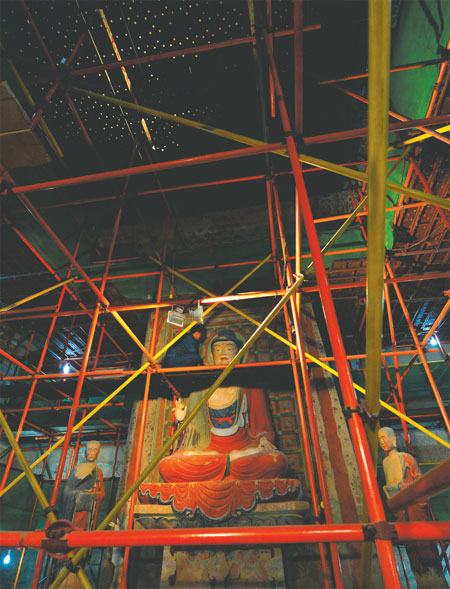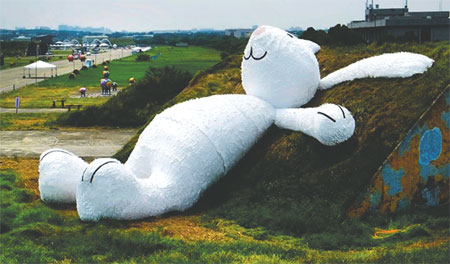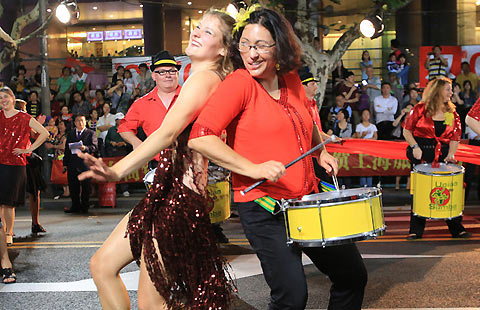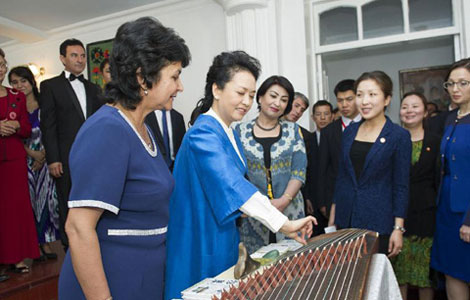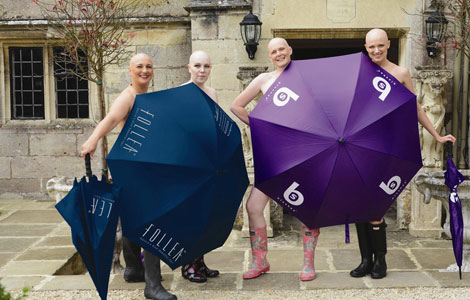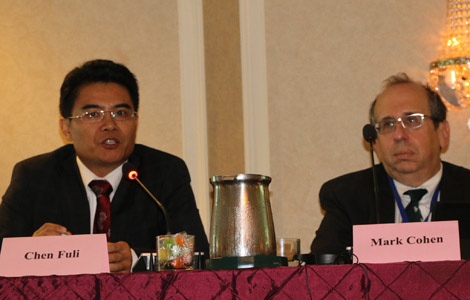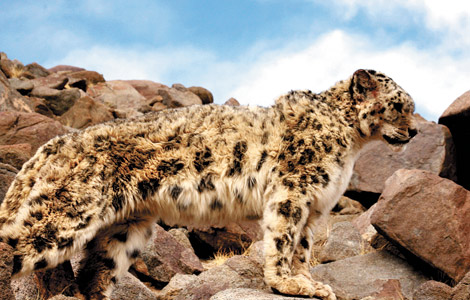News in review Friday, September 5 to Thursday, September 11
Updated: 2014-09-12 11:26
(China Daily USA)
|
|||||||||

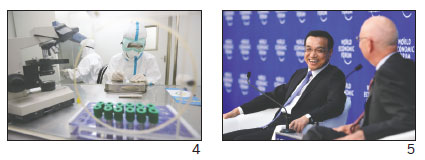
Friday - September 5
China sees drop in number of foreign tourists
China is experiencing a decline in the number of foreign tourists and the country has a tourist-spending deficit.
Beijing had 2.36 million overseas visitors in the first seven months of 2014, a decrease of 5.9 percent year-on-year, the National Tourism Administration said. Chinese tourists spent $47 billion more overseas than the amount spent by foreign visitors in China in the first six months of this year, which means China has the largest tourism trade deficit, according to a report by the China Tourism Academy.
Judith Heinrich, of German travel agency trip.me, said, "The hot destinations in China contain more small cities like Guilin and counties in Tibet," she said.
She also said many Germans declined offers to visit China, citing the pollution and the appreciation of the yuan as the main reasons.
Anti-graft push to go five more years, at least
China's campaign against extravagance and corruption will continue for at least five years, said the anti-corruption chief.
Wang Qishan, secretary of the Central Commission for Discipline Inspection, said in a speech that the fight against corruption is a war that "the nation cannot afford to lose", according to a television report.
The central government's fight against lavishness and graft began in November 2012 when President Xi Jinping took office.
The Central Commission opened a "special tipoff section" on its website in early August inviting people to report officials who are spending lavishly or using public funds to buy gifts during the festival. Those found in violation of the rules will be named in a weekly report on the commission's website.
Monday - September 8
Mooncake exports pick up for US, Europe
Chinese mooncakes are returning to US and European markets following a number of bans five years ago.
The US has banned Chinese mooncakes that contain egg yolk since 2009. The EU and Japan followed suit, raising the threshold on aflatoxin in mooncakes.
After an initial dent in sales, manufacturers have improved exports with products that meet the standards of recipient countries. Many of the mooncake consumers overseas are Chinese, and Monday was the Mid-Autumn Festival holiday, an occasion for families to reunite and eat mooncakes.
The pickup in exports is particularly evident in Guangdong province, well-known for its mooncakes made with lotus seed paste. This year, it exported 1,300 metric tons of mooncakes worth $10 million by August, a slight increase from last year.
Sales of mooncakes in Guangdong have plummeted after the country's top anti-graft body banned the use of public funds to purchase the delicacy. (Photo 1)
'Smart chopsticks' screen for safe food
Diners in China have experienced a litany of food scandals, from recycled cooking oil to fox meat and chemicals. Now Internet search giant Baidu says it has developed a pair of "smart chopsticks" that can detect food safety.
The device contains sensors that can determine the freshness of oil used to cook the food and whether or not it is fit for consumption. The chopsticks flash a red light when they detect the food is not fresh.
It was not clear whether the chopsticks will go into production. A company spokesman said a limited run of prototypes has been made and no release date or price has been set. (Photo 2)
Tuesday - September 9
Rich get richer and there are more millionaires
The ranks of China's rich people keep expanding.
According to the Hurun Report, the Shanghai-based media group that documents the rising ranks of the Chinese rich, more than 2.9 million Chinese people had personal wealth of more than 6 million yuan ($976,100) by the end of last year - 100,000 more than a year earlier. People with personal wealth of over 100 million yuan increased by 2,500 to reach 67,000 by last year, the report said.
Their favorite investment, despite the recent downturns, is still property, according to the report, and the current favorite property in Shanghai is a golf villa. Another area of investment by rich people is their personal health, according to the report.
About 40 percent of these rich people prefer overseas hospitals.
Harvard gets its biggest donation ever
Harvard University's School of Public Health has received a $350 million donation, the largest in its history, from a foundation run by two wealthy Hong Kong brothers.
Julio Frenk, dean of the School of Public Health, said the Morningside Foundation gift will support research and training in four areas: pandemics; environmental health risks; poverty and humanitarian crises, including war and natural disasters; and failing health systems.
The Morningside Foundation was established in 1996 by Drs Ronnie and Gerald Chan to support higher education in North America and Asia. Their father, T.H. Chan, founded Hang Lung Group Ltd, one of Hong Kong's largest real estate companies. He died in 1986. The school will be renamed the Harvard T.H. Chan School of Public Health.
|
Work is being carried out at the restoration site of cave No 98 at the Mogao Grottoes in Gansu province. More than 5,000 square meters of cracked, flaked, faded and detached murals have been successfully restored in the past 70 years. Chen Bin / Xinhua |
Wednesday
- September 10Premier says antitrust probes are balanced
Only 10 percent of the total number of companies being investigated by Chinese antitrust authorities are foreign enterprises, Premier Li Keqiang said, dismissing speculation that foreign companies are being targeted.
Li spoke Tuesday at a Q&A meeting with foreign corporate leaders in Tianjin, site of the Davos Summer program.
"I feel concerned that you are actually concerned," Li told the leaders, most of whom were heads of multinationals. "China's door has opened, and it will never be closed again."
"We improved the transparency of government supervision to restore the fairness of the market," he said. "But some of our efforts have been misinterpreted."
The American Chamber of Commerce said earlier this month that most of its members feel less welcome in China. (Photo 5)
Beijing hospital developing app to fight depression
A Beijing hospital is developing an app for mobile devices that can help people with depression, the Beijing News reported.
The app is part of Beijing's effort to raise awareness for depression and prevent suicide.
The app will provide treatment methods, online inquires and appointments, psychological interventions and prognosis.
It features tests that help determine if the user is depressed; it will also monitor and display physical signs through cardiograms and electroencephalograms.
The app was initiated and is being developed at the psychological research and intervention center at Beijing's Huilongguan Hospital. It is expected to be completed within three years.
About 287,000 Chinese people commit suicide each year, and 2 million attempt it, according to China's health authorities.
Thursday - September 11
Capital region faces curb on water use
Water use in Beijing, Tianjin and Hebei province will be capped at about 30 billion cubic meters annually by 2030 to protect the environment and encourage sustainable economic development in the region, under a draft plan.
Nearly 26 billion cubic meters of water was consumed in 2012. Water availability per capita in Beijing, Tianjin and Hebei province is a mere 239 cu m annually, a fraction of the international per-capita standard of 1,700 cu m annually, according to statistics released by the Ministry of Water Resources.
According to the international yardstick, any measure below 1,700 cu m represents a shortage.
China suffers from severe water shortages, with more than 66 percent of cities facing scarcity, according to the ministry.
VW, Chrysler fined for monopoly violations
Two multinational automakers were punished by local authorities for monopoly violations.
FAW-Volkswagen Sales Co was fined 248.58 million yuan ($40.51 million) by Hubei Bureau of Price Supervision. The punishment is equivalent to 6 percent of the company's sales in 2013.
Seven dealers of its luxury brand, Audi, were fined 29.96 million yuan, equivalent to 1 to 2 percent of 2013 sales.
Chrysler Group China Sales Ltd was fined 31.68 million yuan by the Shanghai Municipal Development and Reform Commission, which is equivalent to 3 percent of its sales of the previous year.
The National Development and Reform Commission has to date reviewed 335 anti-monopoly cases against companies, among which 33, or 10 percent, involved foreign invested companies.
|
A 25.3-meter-long giant rabbit designed by Dutch artist Florentijn Hofman is displayed at an old aircraft hangar as part of the Taoyuan Land Art Festival in Taoyuan, northern Taiwan last week. Agencies |
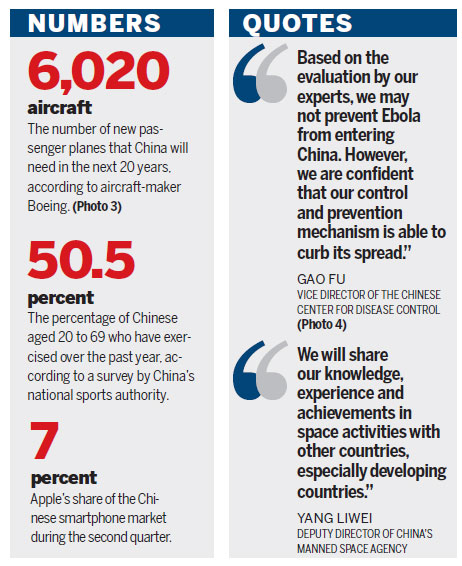
(China Daily USA 09/12/2014 page8)
Most Viewed
Editor's Picks

|

|

|

|

|

|
Today's Top News
Chinese president arrives in Maldives for state visit
US tourist in DPRK gets 6 years of hard labor
China, Central Asia unveil new energy cooperation
Alibaba roadshow bodes well for record-breaking IPO
Chinese plant joins US firm in fuel ingredient production
CITIC braces for legal battle in HK
Xi calls for three-way economic corridor
Paulson, Rudd tackle China's future
US Weekly

|

|
